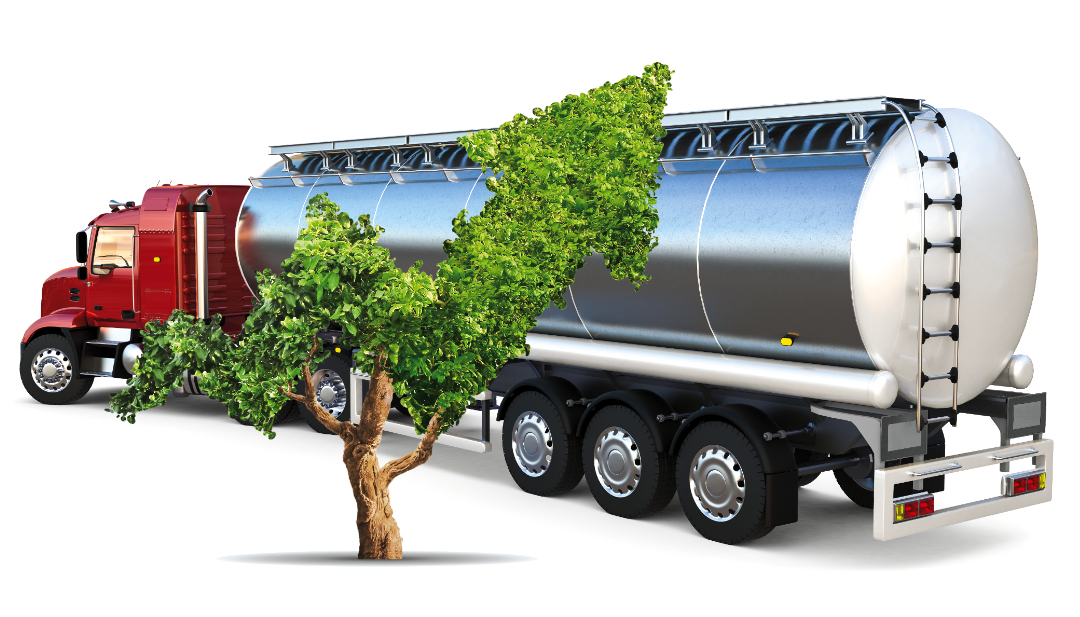States and cities across the country are utilizing RD to meet transportation clean energy goals
Renewable diesel adoption is expected to drastically increase over the next few years. During 2022, renewable diesel and other biofuels saw a year-over-year increase of 71 percent in U.S. production capacity. Renewable diesel capacity, as reported by the Energy Information Administration (EIA), projects a potential of 5.9 billion gallons by the end of 2025. That’s about one-tenth of the current annual diesel consumption in the U.S.
Historically, biodiesel production has substantially outpaced renewable diesel production, but this began to change in recent years due to a boom in building out renewable diesel production capacity.
Like biodiesel, renewable diesel is made of renewable resources such as natural fats, vegetable oils and greases. However, renewable diesel differs from biodiesel in how it’s processed.
Biodiesel uses a relatively simple chemical reaction production process. In contrast, renewable diesel is fully refined and cracked using petroleum refining technology. This results in a “drop-in” hydrocarbon fuel that meets the same technical specifications as petroleum diesel. This allows it to be used in existing infrastructure and conventional diesel engines without modifications or performance degradation.
Renewable Diesel Benefits
Because renewable diesel is hydrogenated, it doesn’t contain oxygen. That means users will not encounter some of the challenges biodiesel presents relating to freezing temperature and storage.
Renewable diesel also burns cleaner than biodiesel. In its R100 state, renewable diesel reduces GHG emissions from heavy-duty vehicles by approximately 62 percent compared to petroleum diesel. Renewable diesel can also help reduce certain air pollutants such as particulate matter, nitrous oxides, and carbon monoxide when compared to petroleum diesel.
While renewable diesel is a “drop-in” replacement fuel in its pure form (R100), it can be blended in any ratio with petroleum diesel. In contrast, biodiesel is often blended with petroleum diesel at lower levels (B2, B5 and B20), but higher ratio blends could require vehicle modifications.
California’s Low Carbon Fuel Standard
Across the U.S., renewable diesel supply is most prevalent in California, with over 570 fueling stations in the state. Most imported and domestically produced renewable diesel is consumed in California. This can be attributed to the state’s favorable policies, such as the Low Carbon Fuel Standard, which have made the economics of renewable diesel competitive with that of petroleum diesel.
Renewable diesel pricing is only cost competitive in California. The price for renewable diesel in California typically follows the cost of petroleum diesel, but it becomes cost prohibitive without the economic incentives provided by the state’s Low Carbon Fuel Standard.
Renewable diesel is also growing in Oregon, Washington, Idaho, and Montana.
NYC Transitions to Renewable Diesel
New York City is transitioning all of the heavy-duty vehicles in the city’s fleet to renewable fuel. The city’s fleet currently includes more than 12,600 on- and off-road trucks and specialized equipment that operate on diesel fuel. By the end of this year, they will all operate on renewable diesel.
As the city works to fully electrify its entire vehicle fleet, renewable diesel represents an important intermediate step until viable electric models become fully available for city trucks and specialized equipment.
Renewable diesel will replace up to 16 million gallons of fossil fuel used every year to power the city’s heavy-duty fleet, which includes garbage trucks and ambulances. According to city officials, after the full rollout of 16 million gallons of renewable diesel is complete, the city will have cut over 140,000 tons of carbon dioxide pollution each year. The transition began September 2023, with 2.5 million gallons of renewable diesel already used across heavy-duty vehicles.
Currently, 20,450 city vehicles (nearly three-quarters of the entire fleet) use a type of cleaner fuel alternative, such as electric, solar, hybrid, or biofuels. The city is also on track to meet its goal of eliminating half of the fleet’s 2015 greenhouse gas emission levels by 2025, as outlined in the NYC Clean Fleet Plan.
Under a multi-year contract with New York City, Approved Oil Company will supply renewable diesel to the fleets of various New York City agencies, including the Department of Sanitation, the Police Department, the Fire Department, the Department of Environmental Protection, the Department of Transportation, the Department of Parks and Recreation, and the Department of Corrections.
New Jersey Township Moves to Renewable Diesel
The New Jersey Township of North Brunswick is transitioning all of its diesel vehicles and equipment to renewable diesel. This makes North Brunswick the first township in New Jersey moving to renewable diesel.
In early May 2024, the township conducted an initial trial focused on switching fossil diesel to renewable diesel. The township’s Department of Public Works trucks were fueled during the trial using Neste MY Renewable Diesel.
Because Neste MY Renewable Diesel is compatible with all diesel engines, North Brunswick was able to transition to this fuel without the need for new fueling infrastructure or investment into fleet modifications.
Now, North Brunswick’s entire fleet with diesel engines, including emergency medical services vehicles, fire trucks, public works vehicles, school buses, and backup generators, are powered by renewable diesel. These vehicles and equipment will use over 48,000 gallons of renewable diesel annually. This can reportedly help reduce GHG emissions by up to 470 tons annually compared to the use of petroleum diesel.
It’s worth noting that it’s not unusual for a small amount of biodiesel to be blended with renewable diesel for lubricity.
Ed and Kelly Burke are respectively Chairman of the Board and Senior Marketing Manager at fuel distributor Dennis K. Burke Inc. They can be reached at 617-884-7800 or ed.burke@burkeoil.com and kelly.burke@burkeoil.com.


